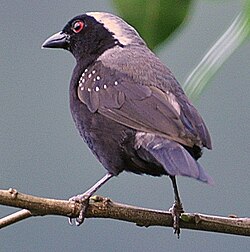The nigritas, formerly called negrofinches, are small passerine birds belonging to the genus Nigrita in the estrildid finch family Estrildidae. There are four species which occur across the African tropical rainforest.
| Nigrita | |
|---|---|

| |
| Grey-headed nigrita (N. canicapillus) | |
| Scientific classification | |
| Kingdom: | Animalia |
| Phylum: | Chordata |
| Class: | Aves |
| Order: | Passeriformes |
| Family: | Estrildidae |
| Genus: | Nigrita Strickland, 1843 |
| Type species | |
| Aethiops canicapillus Strickland, 1841
| |
| Species | |
| |
They are 10-15 centimetres long. The bill is short and black and is fairly slender in some species. The colour of the plumage varies but all have a dark tail. The upperparts are grey or brown and the underparts are black, grey, white or reddish brown. The grey-headed nigrita and male pale-fronted nigrita have a black face and the white-breasted nigrita has a black cap. Nigritas have whistling or trilling songs and calls.
They feed on insects, fruit and seeds. They often forage high in the treetops, usually alone or in pairs.
Taxonomy
editThe genus Negrita was introduced in 1843 by the English naturalist Hugh Edwin Strickland as a replacement name for Aethiops.[1] Strickland had introduced the genus Aethiops in 1841 in the combination Aethiops canicapillus for the grey-headed nigrita.[2] The name Aethiops was pre-occupied as it had been used earlier in 1841 by William Martin for a genus of monkeys. The type species is Aethiops canicapillus Strickland, by monotypy.[3] The genus name Negrita is from Modern Latin negritus meaning "black".[4]
Species list
editThe genus contains four species:[5]
| Image | Scientific name | Common Name | Distribution |
|---|---|---|---|
| Nigrita fusconotus | White-breasted nigrita | widespread | |
| Nigrita bicolor | Chestnut-breasted nigrita | widespread | |
| Nigrita luteifrons | Pale-fronted nigrita | widespread | |
| Nigrita canicapillus | Grey-headed nigrita | widespread |
References
edit- ^ Strickland, Hugh Edwin (1842). "Negrita fusconotus". Proceedings of the Zoological Society of London. 10 (117) (published 1843): 145. For the publication date see: Sclater, P.L. (1893). "List of the dates of delivery of the sheets of the 'Proceedings' of the Zoological Society of London, from the commencement in 1830 to 1859 inclusive". Proceedings of the Zoological Society of London: 436–440.
- ^ Strickland, Hugh Edwin (October 1841). "Aethiops canicapillus". Proceedings of the Zoological Society of London. 9 (99): 30.
- ^ Paynter, Raymond A. Jr, ed. (1968). Check-List of Birds of the World. Vol. 14. Cambridge, Massachusetts: Museum of Comparative Zoology. pp. 308–309.
- ^ Jobling, James A. "Nigrita". The Key to Scientific Names. Cornell Lab of Ornithology. Retrieved 7 August 2025.
- ^ Gill, Frank; Donsker, David; Rasmussen, Pamela, eds. (February 2025). "Waxbills, parrotfinches, munias, whydahs, Olive Warbler, accentors, pipits". IOC World Bird List Version 15.1. International Ornithologists' Union. Retrieved 7 August 2025.
- Clement, Peter; Harris, Alan & Davies, John (1993) Finches and Sparrows: An Identification Guide, Christopher Helm, London.
- Sinclair, Ian & Ryan, Peter (2003) Birds of Africa south of the Sahara, Struik, Cape Town.